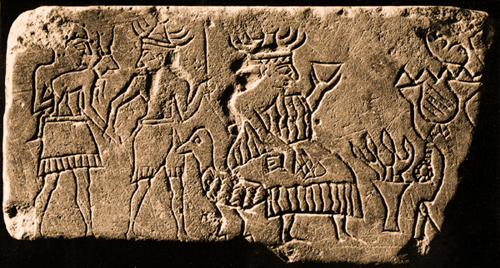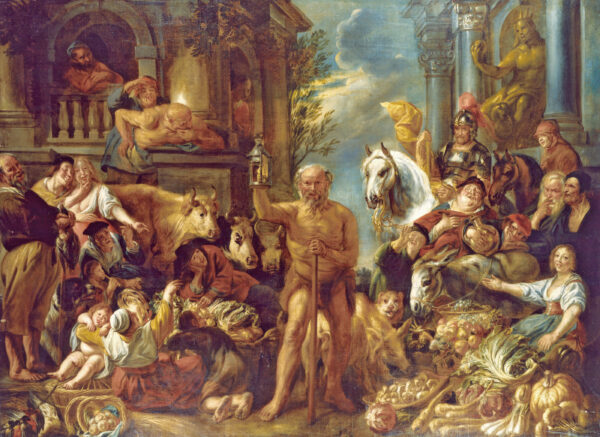![Title: Silence [Click for larger image view]](https://diglib.library.vanderbilt.edu/cdri/jpeg/silencenmh9h5b8g7y7gh201.jpg) In the alternate Hebrew Bible reading for this Sunday (Zephaniah 1:7, 12-18), the prophet calls for reverential silence, as God prepares to act:
In the alternate Hebrew Bible reading for this Sunday (Zephaniah 1:7, 12-18), the prophet calls for reverential silence, as God prepares to act:
“Hush before the LORD God,
for the day of the LORD is near!” (Zeph 1:7; cf. Amos 8:3; Hab 2:20; Zech 2:13).
The day of the LORD is the central theme of the book of Zephaniah. Beth Stovell and David Fuller neatly define the day of the LORD as “a day when YHWH intervenes” (The Book of the Twelve [Eugene, OR: Cascade, 2022], 8, emphasis theirs). In Zephaniah, that day is further depicted as “a day of fury” (Zeph 1:15, 18; 2:2-3). But this prophet uses the concept of God’s wrath in ways that may surprise us.
Zephaniah 2:1-3 opens a collection of oracles directed against foreign nations, including Assyria, so we might at first think that God directs God’s wrath toward outsiders. But the prophet’s audience is not the nations, but his own people in Judah. These oracles expressly address “you humble of the land who practice his justice” (2:3). Thus, the “shameless nation” in 2:1 is not a foreign power, but Judah.
At the end of this chapter, the prophet moves without transition from an oracle against Nineveh, Assyria’s capital (Zeph 2:13-15), to an oracle concerning the “obstinate one, the defiled one, the violent city” of Jerusalem (Zeph 3:1-8)! Wrath language, then, serves more as a warning for the faithful than as a condemnation of the faithless.

In Sunday’s reading from Zephaniah, the day of the LORD’s judgment is described as a liturgical feast: “the LORD has prepared a sacrifice, he has consecrated his guests” (Zeph 1:7 NRSVue). But since that day is called “the day of the LORD’s sacrifice” (Zeph 1:8 NRSVue), when the LORD “will punish the officials and the king’s sons,” the nobles and religious leaders seem to be not only the invited guests, but also the sacrifice! They have been consecrated, not to join in the sacred feast, but for the slaughter.
As the superscription to Zephaniah claims that the prophet is a great-great-grandson of King Hezekiah (727-697 BCE), the prophet Zephaniah, himself a member of Jerusalem’s nobility, is taking his own family and friends to task. Zephaniah’s own peers are the ones whose religious corruption, cultural impurity, and social injustice will cause them to be sacrificed on the day of the LORD.

The LORD says,
At that time, I will search Jerusalem with lamps;
I will punish the men growing fat on the sediment in their wine,
those saying to themselves, The Lord won’t do good or evil (Zeph 1:12)
The apathetic nobles of Jerusalem are content to drink themselves into a stupor, heedless of the religious corruption and injustice all around them. They believe God to be as careless as they are: “The LORD will not do good, nor will he do harm” (Zeph 1:12 NRSVue; cf. Mal 2:17; 3:14-15). Yet their declaration of the irrelevance of faith is about to be revealed for the lie that it is. The day of the LORD, Zephaniah says, will hit them right in the pocketbook:
Their wealth will be looted and their houses destroyed.
They will rebuild houses, but not live in them;
they will plant vineyards, but not drink the wine (Zeph 1:13).
In Zephaniah, the message of God’s wrath turns not outward, against the world, but inward, to effect change within the community of faith. Wrath is God’s response to our unresponsiveness.
Is God indeed a God of wrath? If, as Julia O’Brien succinctly states, “A moral God cares about what happens to the world” (Nahum, Habakkuk, Zephaniah, Haggai, Zechariah, Malachi [Nashville: Abingdon, 2004], 95), then the answer must be a resounding yes! Rob Bell writes:
When we hear people saying that they can’t believe in a God who gets angry—yes, they can. How should God react to a child being forced into prostitution? How should God feel about a country starving while warlords hoard the food supply? What kind of God wouldn’t get angry at a financial scheme that robs thousands of people of their life savings? (Love Wins: A Book About Heaven, Hell, and the Fate of Every Person Who Ever Lived [New York: HarperOne, 2011], 38).
God’s wrath is not opposed to God’s love; rather, God is a God of wrath because God is a God of love. God’s wrath is directed against injustice because God loves justice. God’s wrath is directed against oppression because God loves the oppressed. That is what the day of the LORD means.

The language Zephaniah uses for the day of the LORD is typical of both Testaments: “The great day of the LORD is near; it is near and coming very quickly” (Zeph 1:14; e.g., Isa 13:6; Ezek 7:10-12; Zeph 1:7; Mal 3:1–2). Just so, Mark summed up Jesus’ proclamation in a single verse: ““Now is the time! Here comes God’s kingdom! Change your hearts and lives, and trust this good news!” (Mark 1:15). And Revelation begins and ends with this promise: “the time is near. . . The one who bears witness to these things says, ‘Yes, I’m coming soon.’ Amen. Come, Lord Jesus!” (Rev 1:3; 22:20).
In the Revised Common Lectionary, Zephaniah 1:7, 12-18 is read together with Matthew 25:14-30 (the parable of the talents, which portrays God’s final judgment) and 1 Thessalonians 5:1-11, regarding “the day of the Lord” coming imminently and unexpectedly, “as a thief in the night.”
First Thessalonians was Paul’s first letter, and so the oldest book (dating to around 50 CE) in our New Testament. Paul wrote to offer reassurance to a struggling church: the first he had established in Europe (see Acts 17:1-10). The Christians of Thessalonica were concerned because some of their members had died: perhaps from persecution, but perhaps too from illness or old age (1 Thes 4:13-14). Believing, as Paul had taught them, that Christ would come soon, they feared that these faithful dead would have no share in Christ’s kingdom. Paul, however, assured them that, far from being left behind, those believers who had died would have the inside track in the world to come:
What we are saying is a message from the Lord: we who are alive and still around at the Lord’s coming definitely won’t go ahead of those who have died. This is because the Lord himself will come down from heaven with the signal of a shout by the head angel and a blast on God’s trumpet. First, those who are dead in Christ will rise. Then, we who are living and still around will be taken up together with them in the clouds to meet with the Lord in the air. That way we will always be with the Lord. So encourage each other with these words (1 Thes 4:15-18)
Paul does not describe, as some Christians claim, an escape from this world prior to Christ’s return–often called “the Rapture.” Jesus is not taking the church up out of the world. He is himself coming down: descending to rule the world. Paul writes, “the Lord himself will come down from heaven with the signal of a shout by the head angel and a blast on God’s trumpet,” and as he does so, both the resurrected dead and also “we who are living and still around” rise to meet him in the air. This isn’t an escape plan–it’s a welcome back party!
Also, note the present tense, friends–“we who are living and still around.” For Paul, as for Zephaniah, John, and Mark, the day of the LORD is not a message for someday, in the indefinite future: it speaks with imminence and urgency, and calls us to action here and now.
![]()
Jesus taught us to pray daily, “Bring in your kingdom” (Matt 6:9-13; Luke 11:2-4). What might it mean for us, in this time and place, to live under Christ’s reign?